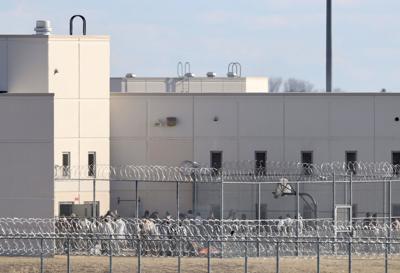LINCOLN — Officials with the union that represents corrections officers maintained Monday that understaffing and improper staffing led to the stabbing of an officer at Tecumseh State Prison last week, though a prison spokeswoman disputed that.
An officer was stabbed 15 times on Thursday with an improvised knife in an attack by two inmates at the prison’s Special Management Unit, an area where the most unruly and uncontrollable inmates are held in solitary confinement. The officer, who suffered what were described as serious injuries, was treated and released from a local hospital.
Officials with the Fraternal Order of Police Lodge 88 said that, on that evening, the SMU was staffed by at least one fewer officer than normal and that “many” of those working were inexperienced “probationary” officers with less than six months of experience and no training in handling dangerous inmates. Union officials also complained that requests to equip SMU workers with “stab-proof vests” have been rejected by state prison officials.
“We’re trying to prevent someone from getting killed,” said Michael Chipman, president of the FOP, at a press conference Monday morning.
But Laura Strimple, a spokeswoman for the State Department of Corrections, disputed the claims. She said that the unit was “correctly staffed” at the time of the assault, and of the nine officers assigned to SMU at that time, the three that were involved in the incident were all properly trained.
Six others assigned to the unit lacked the training to work with solitary confinement, but only one was within their probationary period, Strimple said.
“We will have training for next week for employees who work with those in restrictive housing,” she said.
Union officials said that the assault, and presence of a weapon that wasn’t found in searches of cells and inmates, is another symptom of the low pay, high turnover and exhausting overtime requirements of corrections security staff. The only solution, they said, is to increase prison staff by hiking salaries so they match that of county jails in eastern Nebraska, which are luring state prison workers away, prompting increased overtime to fill vacant posts and turnover rates above 30 percent.
“This is a wake-up call,” said Carla Jorgens, another union official.
But Strimple said increased pay does not automatically translate into a lower risk of assault.
“As Director (Scott) Frakes has testified numerous times, employee recruitment and retention are about more than just pay. It is also about providing appropriate training, creating a safe working environment and giving workers opportunities for advancement and growth,” she said.
Strimple said that the agency is reviewing how the inmates got an improvised knife. The stab-proof vests, she said, are in use in a high-security wing of the Tecumseh prison but had been denied in the SMU because inmates there are regularly searched for weapons.
The FOP and the Ricketts administration failed to reach a contract agreement earlier this year, which prompted the corrections union to take their case to a state labor court. The Nebraska Commission on Industrial Relations ruled against the union, stating that corrections officers here were actually paid more than comparable states and that no raise in pay was warranted.
The FOP said the ruling wasn’t based in reality, and that wages should have been compared with Douglas, Sarpy and Lancaster Counties, which pay considerably higher salaries and — unlike the state — provide salary increases for longevity.
Don Hardy, an FOP official who works at the Tecumseh State Prison, said that since the FOP’s ruling in March, turnover and overtime problems have increased. He said that just recently, officers at Tecumseh logged more than 2,000 hours of overtime in a single week, with many officers working up to 80 hours a week.
To fill vacant posts at Tecumseh, the state has begun transporting officers, in state-paid vans, from Omaha every day to the rural facility. State officials have blamed the tight labor market in Nebraska, in large part, for an inability to hire enough corrections officers.
















